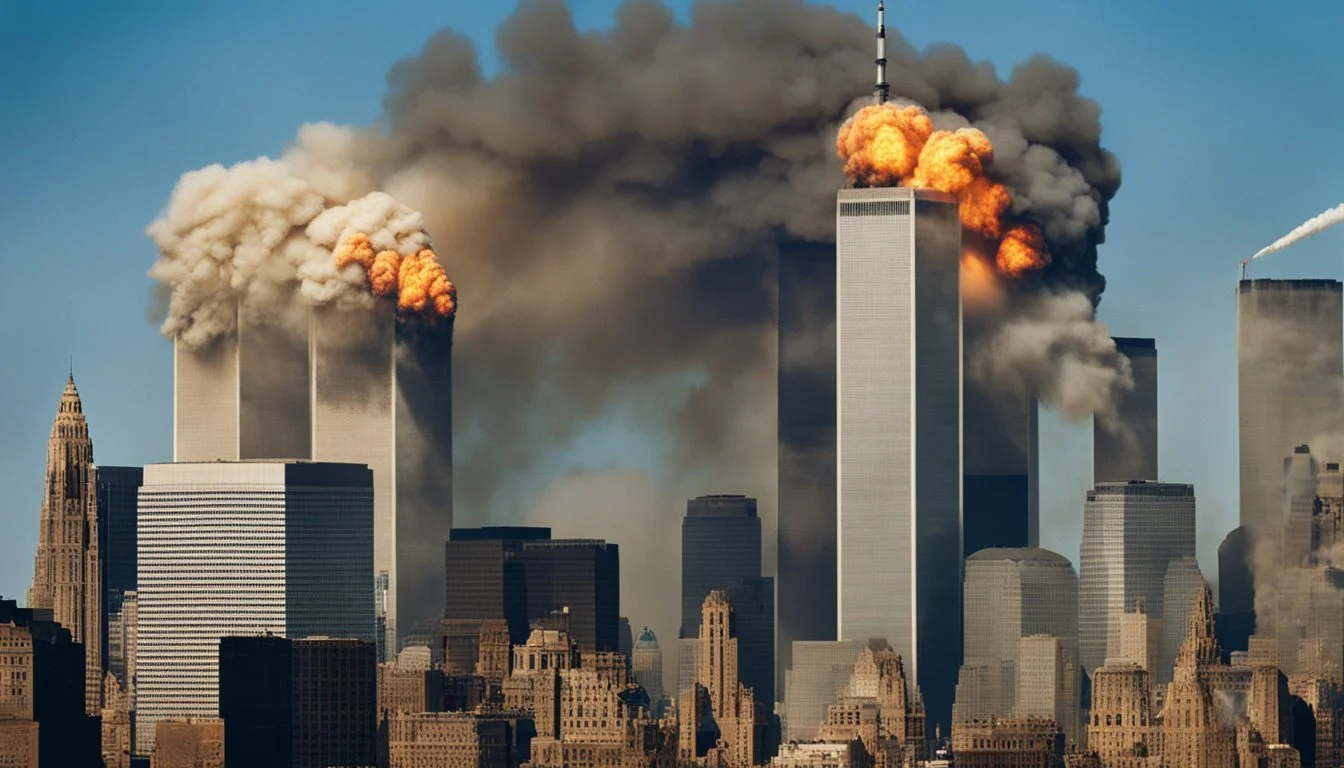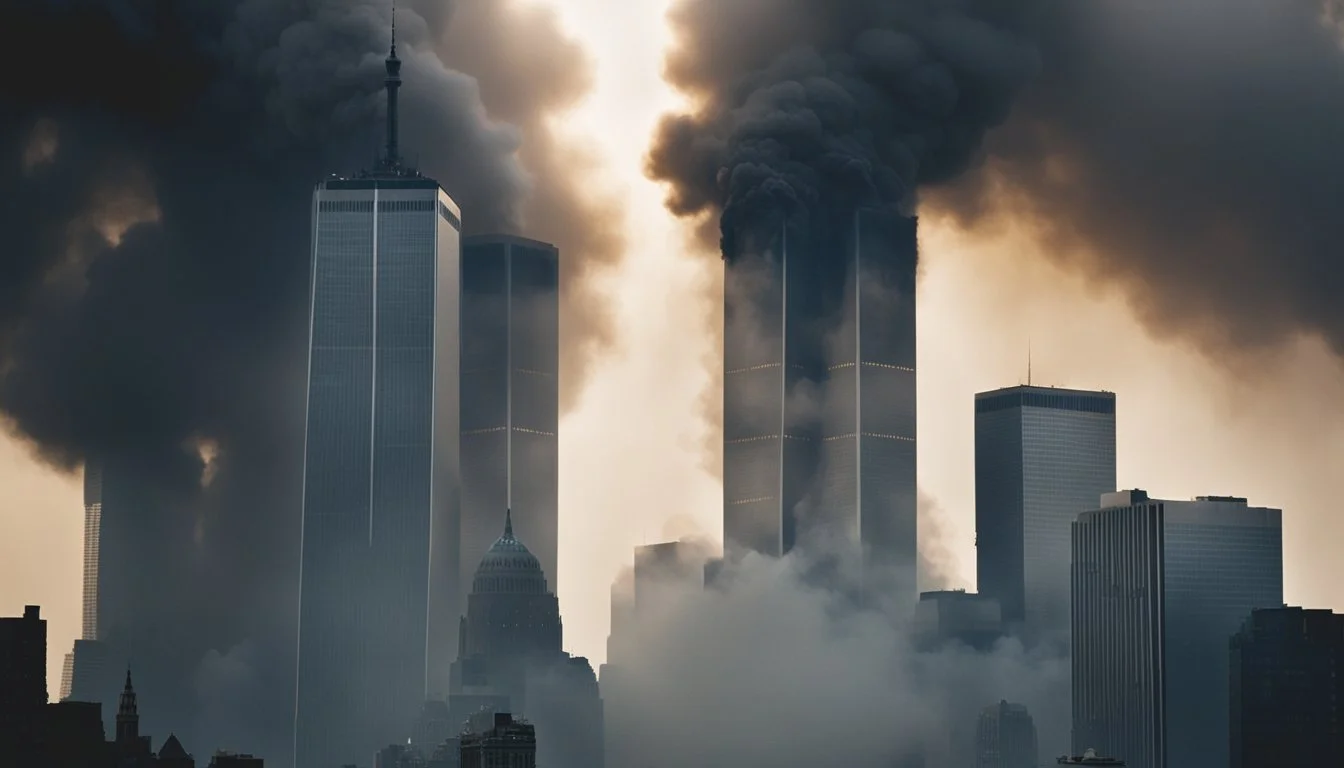7 Powerful 9/11 Documentaries You Need to Watch
Unveiling Truth and Honoring Heroes
The events of September 11, 2001 left an indelible mark on American history and the world. Documentaries have played a crucial role in preserving memories, uncovering new insights, and helping people process the tragedy and its aftermath.
These films offer unique perspectives on 9/11, from personal stories of survivors to in-depth analyses of the day's events and their far-reaching consequences. By exploring different aspects of this pivotal moment, viewers can gain a deeper understanding of its impact and significance. The documentaries selected provide a range of viewpoints and information, allowing audiences to reflect on the events of 9/11 and their ongoing relevance.
1) 9/11: Inside the Pentagon (2016)
"9/11: Inside the Pentagon" offers a unique perspective on the September 11 attacks. This documentary focuses on the often-overlooked attack on the Pentagon, where 184 people lost their lives.
The film features firsthand accounts from survivors and emergency responders. It provides a detailed look at the events that unfolded inside the Pentagon on that fateful day.
Viewers gain insight into the heroic efforts of those who helped evacuate the building and save lives. The documentary also explores the emotional aftermath for those directly affected by the attack.
Through interviews and archival footage, the film paints a vivid picture of the chaos and bravery witnessed at the Pentagon. It serves as a powerful tribute to the victims and survivors of this lesser-known aspect of 9/11.
For more information, visit IMDb.
2) 102 Minutes That Changed America (2008)
"102 Minutes That Changed America" offers a raw, unfiltered look at the events of September 11, 2001 in New York City. This documentary compiles amateur footage from numerous individuals who captured the attacks and their aftermath.
The film unfolds in real-time, starting from the moment the first World Trade Center tower is hit. It provides a minute-by-minute account of the catastrophe as it unfolded on that fateful morning.
Viewers experience the shock, confusion, and fear that gripped New Yorkers through the lenses of ordinary citizens. The documentary avoids narration or commentary, allowing the footage to speak for itself.
This approach creates a visceral, immersive experience that transports viewers back to that day. The film captures not only the physical destruction but also the human reactions to an unprecedented tragedy.
"102 Minutes That Changed America" won an Emmy Award for its powerful portrayal of one of the most significant events in recent history. It stands as a testament to the importance of preserving first-hand accounts for future generations.
3) 9/11: The Falling Man (2006)
"9/11: The Falling Man" examines a controversial photograph taken on September 11, 2001. The image captures a man falling from the North Tower of the World Trade Center.
The documentary explores the public's reaction to this haunting picture and why it was later deemed too sensitive for widespread circulation. It delves into the ethical implications of publishing such graphic content.
Directed by Henry Singer, the film investigates the identity of the man in the photograph. It presents interviews with families of victims and survivors, offering personal perspectives on this tragic moment.
The documentary raises important questions about media responsibility and the balance between journalistic duty and respect for victims' families. It provides a thoughtful exploration of how we memorialize tragedy and confront difficult truths.
More information on "9/11: The Falling Man"
4) Rebirth (2011)
"Rebirth" (2011) offers a unique perspective on the aftermath of 9/11. Director Jim Whitaker follows five individuals whose lives were profoundly impacted by the attacks.
The documentary spans nearly a decade, tracking the subjects' physical and emotional journeys from 2002 to 2009. It provides an intimate look at their struggles, resilience, and healing processes.
Whitaker's film stands out for its use of time-lapse photography. These sequences show the gradual reconstruction of Ground Zero, serving as a visual metaphor for the healing process.
"Rebirth" balances personal stories with broader themes of recovery and renewal. It explores how individuals and communities can move forward after tragedy while honoring the past.
The film received critical acclaim for its sensitive portrayal of grief and recovery. It offers viewers a thoughtful examination of 9/11's long-term impact on those directly affected.
5) Generation 9/11 (2021)
"Generation 9/11" (2021) offers a unique perspective on the long-term impacts of the September 11 attacks. The documentary focuses on children born after their fathers perished in the World Trade Center.
These young adults, now in their late teens and early twenties, share their experiences growing up in the shadow of 9/11. They discuss how the tragedy shaped their lives and worldviews.
The film explores themes of loss, resilience, and identity. It illustrates how these individuals have come to understand their personal connections to a pivotal historical event they never directly experienced.
Through interviews and archival footage, the documentary paints a poignant picture of legacy and healing. It showcases how the children have honored their fathers' memories and forged their own paths.
"Generation 9/11" provides insight into the ongoing ripple effects of the attacks on American society. It reminds viewers that the impact of 9/11 continues to resonate with new generations.
6) In the Shadow of the Towers: Stuyvesant High on 9/11 (2019)
This documentary offers a unique perspective on the September 11 attacks through the eyes of eight former students from Stuyvesant High School. The school's proximity to the World Trade Center placed these young individuals at the heart of the unfolding tragedy.
Directed by Emmy-winner Amy Schatz, the film provides intimate access to eyewitnesses who were teenagers at the time. Their recollections offer a raw and personal account of that fateful day.
The documentary explores how the events of 9/11 shaped the lives of these students. It captures their memories of confusion, fear, and the sudden loss of innocence as they witnessed history unfold before their eyes.
Through candid conversations, the film paints a vivid picture of the impact of the attacks on young minds. It showcases the resilience of youth in the face of unprecedented trauma.
"In the Shadow of the Towers" serves as a powerful testament to the enduring effects of 9/11 on those who experienced it firsthand. It provides viewers with a poignant and rarely seen perspective on this pivotal moment in history.
7) What Happened on September 11 (2019)
This documentary provides a comprehensive look at the events of September 11, 2001. It chronicles the timeline of that fateful day, from the first plane striking the North Tower to the collapse of both World Trade Center buildings.
The film uses a mix of archival footage and interviews with survivors, first responders, and witnesses. It offers a moment-by-moment account of the attacks, including the hijackings, the impact on the Pentagon, and the crash of Flight 93 in Pennsylvania.
Viewers gain insight into the immediate aftermath and the heroic efforts of emergency personnel. The documentary also explores the emotional toll on those directly affected and the nation as a whole.
By presenting a detailed and factual narrative, "What Happened on September 11" serves as an important historical record. It helps preserve the memory of those lost and educates younger generations about this pivotal moment in American history.
More information on "What Happened on September 11”, on IMDb.
Historical Context
The September 11, 2001 attacks reshaped the global landscape, profoundly impacting geopolitics and security policies worldwide. These events led to sweeping changes in international relations and sparked conflicts that continue to reverberate today.
Overview of 9/11 Events
On September 11, 2001, 19 al-Qaeda terrorists hijacked four commercial airliners in the United States. Two planes struck the World Trade Center towers in New York City, causing their collapse. A third plane hit the Pentagon in Washington, D.C. The fourth crashed in Pennsylvania after passengers fought back.
The attacks resulted in 2,977 fatalities, excluding the 19 hijackers. Over 25,000 people were injured. The twin towers' collapse damaged surrounding buildings and blanketed Lower Manhattan in debris and dust.
First responders rushed to the scenes, with many later developing health issues from exposure to hazardous materials.
Impact on Global Politics
The 9/11 attacks triggered significant shifts in U.S. foreign policy and international relations. The U.S. launched the "War on Terror," leading to military interventions in Afghanistan and Iraq.
These conflicts reshaped Middle Eastern politics and had far-reaching consequences for global stability. NATO invoked Article 5 for the first time in its history, considering the attacks an act of war against all member states.
Domestic and international security measures intensified. Many countries implemented stricter border controls, surveillance programs, and anti-terrorism laws. These changes sparked debates about balancing security with civil liberties and privacy rights.
The attacks also influenced economic policies, diplomatic relations, and public perceptions of Islam in many Western countries.
Critical Perspectives
Powerful 9/11 documentaries offer diverse viewpoints through firsthand accounts and expert analysis. These films provide deeper insights into the events and their lasting impact.
Survivor Narratives
Survivor stories form the emotional core of many 9/11 documentaries. Filmmakers capture raw, personal accounts from those who experienced the attacks firsthand. These narratives often focus on split-second decisions and acts of heroism.
Some documentaries feature interviews with first responders who rushed into the burning towers. Others highlight the experiences of office workers who narrowly escaped. The most impactful films balance individual stories with broader context.
Survivor perspectives shed light on the long-term psychological effects of trauma. Many documentaries revisit survivors years later, exploring how their lives changed after 9/11.
Expert Analysis
Documentaries incorporate expert commentary to provide historical context and technical insights. Historians explain the geopolitical factors leading up to the attacks. Security analysts break down the failures that allowed the hijackings to occur.
Structural engineers offer detailed explanations of why the Twin Towers collapsed. Aviation experts discuss the unprecedented challenges faced by air traffic controllers that day.
Some films feature interviews with counterterrorism officials. These experts offer insider perspectives on the intelligence community's response. Policy analysts examine how 9/11 reshaped American foreign policy and domestic security measures.
Documentaries often pair expert analysis with archival footage and graphics. This approach helps viewers understand complex topics like the physics of building collapses.
Documentary Film Techniques
Effective 9/11 documentaries employ specialized techniques to convey the gravity and emotional impact of the events. These methods shape how viewers experience and understand this pivotal moment in history.
Storytelling Approaches
Documentarians use carefully structured narratives to guide viewers through the events of 9/11. Many films employ a chronological approach, starting with the morning of September 11 and progressing through the day's timeline. This method provides context and builds tension.
Some documentaries focus on individual stories, following specific survivors or first responders. This personal angle creates an emotional connection with viewers.
Voiceover narration often bridges gaps between scenes and provides additional information. Expert interviews offer analysis and historical context, helping viewers grasp the wider implications of the attacks.
Use of Archival Footage
Archival footage forms the backbone of many 9/11 documentaries. Filmmakers incorporate news broadcasts, amateur video, and photographs taken on the day to immerse viewers in the unfolding events.
Careful editing of this material creates a sense of immediacy and authenticity. Directors often combine multiple angles of key moments to provide a comprehensive view of the attacks and their aftermath.
Some documentaries use enhanced or colorized archival footage to improve visual clarity. This technique helps modern audiences better engage with older material.
Filmmakers also integrate audio recordings, such as emergency calls and flight communications, to add depth to the visual narrative.


